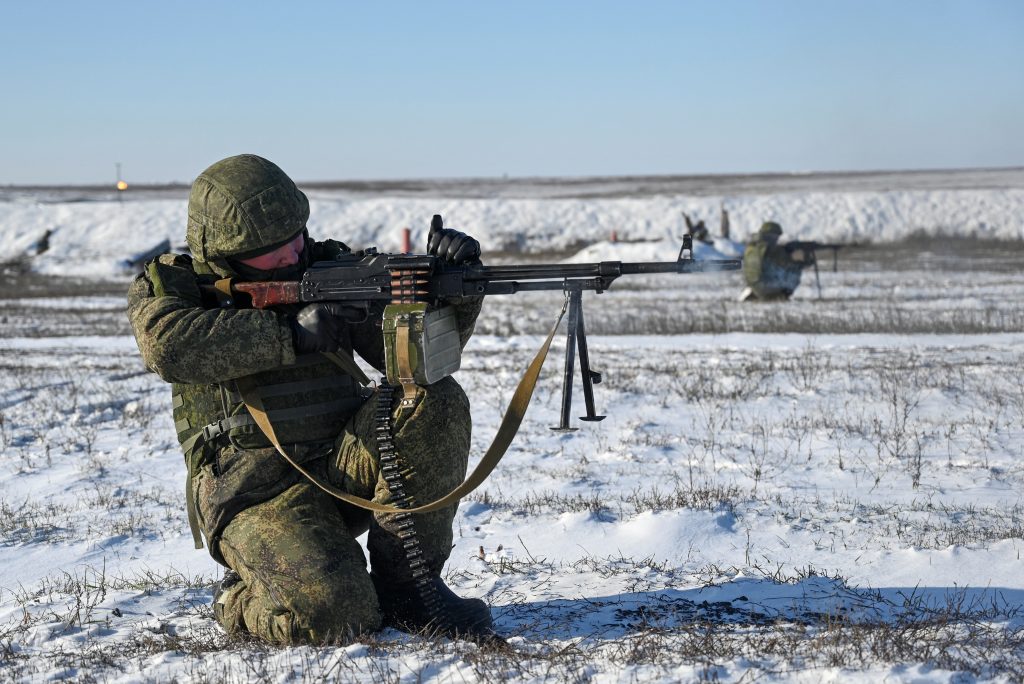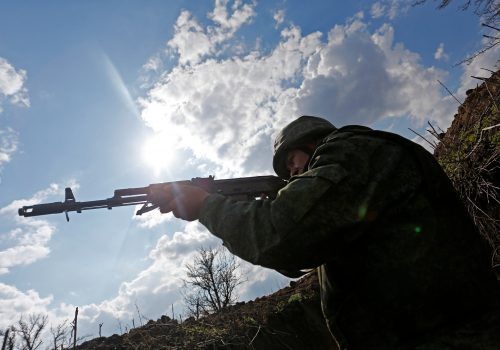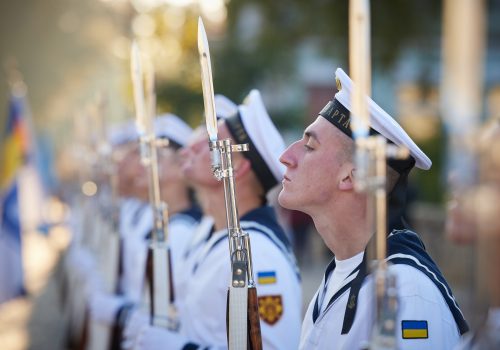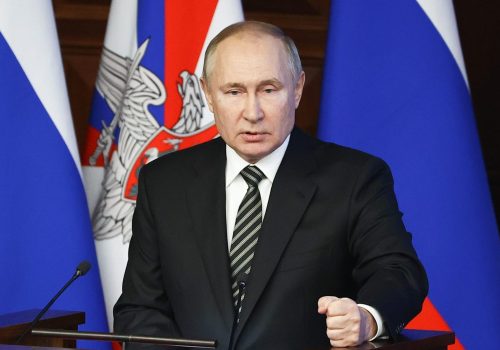Russian and Western officials will hold a series of diplomatic meetings during the coming week in a bid to defuse mounting geopolitical tensions and avert the possibility of a major escalation in Vladimir Putin’s eight-year war against Ukraine. Talks will begin on January 10 with a meeting between senior US and Russian diplomats in Geneva. This will be followed by a session of the NATO-Russia Council in Brussels on January 12. The next day, OSCE members are scheduled to convene in Vienna.
Officially, these meetings will focus on a number of security demands presented in mid-December 2021 by Russia in the form of two draft treaties. Many of the clauses, such as the withdrawal of NATO forces from Central and Eastern Europe and formal guarantees that Ukraine will never join the alliance, are widely regarded as non-starters. However, Kremlin officials have insisted that the two draft treaties are “not a menu” and must be considered as a whole, with Putin promising a “military-technical response” if the West refuses to reduce its military presence in Central and Eastern Europe.
Looming over next week’s negotiations is the threat of a full-scale Russian invasion of Ukraine. Moscow began concentrating its military along the Ukrainian border in late 2021 and has reportedly assembled a vast invasion force including more than 100,000 troops and considerable support logistics capable of maintaining a major offensive.
This build-up has been accompanied by increasingly belligerent rhetoric and unsubstantiated allegations from Russian officials and the Kremlin-controlled state media. Putin and other senior figures have accused Ukraine of posing a growing security threat to Russia, while Russian Defense Minister Sergei Shoigu has made absurd claims of an imminent US chemical weapons attack in eastern Ukraine.
Putin’s saber-rattling indicates Russian frustration over a lack of progress in the country’s ongoing campaign of hybrid hostilities against Ukraine. The conflict began in spring 2014, when Russia seized Ukraine’s Crimean peninsula and launched a proxy war in eastern Ukraine. However, Kremlin expectations of rapid victory were thwarted by unexpectedly strong Ukrainian resistance, leading to a bloody stalemate marked by sporadic fighting along a largely static 400km front line.
Since the end of major combat operations in February 2015, successive Ukrainian leaders have resisted Russian pressure to accept peace on Kremlin terms. Instead, the undeclared war between the two countries has dragged on with no end in sight, eroding Russian influence in Ukraine to historically unprecedented lows.
Despite these setbacks, Putin has made clear that he continues to regard the return of Ukraine to the Russian orbit as his number one foreign policy priority. The extent of Putin’s apparent obsession with Ukraine was laid bare in a remarkable July 2021 essay authored by the Russian leader that openly questioned the historical legitimacy of Ukrainian statehood and argued that “true sovereignty of Ukraine is possible only in partnership with Russia.”
With the Kremlin determined to prevent the loss of Ukraine and demanding sweeping security guarantees that no Western leader could realistically provide, there appears to be little room for compromise during next week’s high-level meetings. Ahead of the coming negotiations, the Atlantic Council asked a range of experts whether diplomacy can still deter Putin and avert a major war in Ukraine.
Alexander Vershbow, Distinguished Fellow, Atlantic Council: President Putin has created the current crisis surrounding Ukraine in a bold effort to halt further NATO enlargement and roll back the changes in European security that have taken place since the end of the Cold War. Next week’s diplomatic trifecta will offer the first indication of whether Russian posturing and demands are aimed at engaging the West in serious negotiations, or whether Putin is just creating a pretext for military aggression.
Moscow’s undeclared war in eastern Ukraine’s Donbas region has always been about more than Ukraine. The Donbas has been a major front in Putin’s larger hybrid war against the West, aimed at restoring Russia’s great power status and preventing the spread of democratic values that could bring down Putin’s authoritarian regime. Moscow hopes that by threatening further aggression against Ukraine, it can scare the West and Kyiv into abandoning the goal of NATO membership and accepting Russian hegemony over Eastern Europe as part of a Yalta-style re-division of Europe.
The Russians are waging an aggressive information campaign to reinforce Putin’s revisionist history of the last 30 years in which Russia has been the victim of a US/NATO conspiracy to weaken Russia and deprive it of its rightful sphere of influence in the former Soviet space. With a mix of fictions and half-truths about NATO’s alleged military encirclement, Russia has sought to justify proposals that would not only halt NATO enlargement but also compel the US and its allies to withdraw their forces and weapons from the territory of members admitted since 1999. This includes the forces NATO has deployed in the East to defend against Russian aggression that is no longer unthinkable following its 2014 invasion of Ukraine.
Moscow knows that most of the elements of its draft treaties are non-starters and blatantly contradict principles Russia itself has accepted in dozens of post-Cold War agreements, including the right of nations to choose their security alliances. The US has said as much, while expressing openness to specific arms control and confidence-building measures in areas mentioned in the Russian texts. These would have to be on the basis of reciprocity (e.g., covering Russia’s already deployed INF Treaty-busting intermediate-range missiles, and not just hypothetical future US systems). If the talks gained traction, they could evolve into a wider discussion of how to rebuild European security architecture in the 21st century after the blows caused by Russia’s aggression.
The US has wisely insisted that, beyond next week’s initial round of talks, serious bargaining can only begin after Russia stands down its forces from Ukraine’s borders. In the meantime, the US and its allies will continue to do everything possible to deter Russia by raising the costs for aggression. Washington has rightfully said that all NATO allies and other concerned partners, including Finland and Sweden as well as Ukraine, must have a voice in the negotiations, based on the principle of “nothing about us without us.” That explains the three fora convening next week: US-Russia bilateral strategic stability talks, the NATO-Russia Council, and the all-inclusive OSCE Permanent Council.
The open question, however, is whether such limited arms control proposals are what Moscow is after. Russian diplomats have said their draft treaties are “not a menu” to pick and choose from but must be accepted in full. If they stick to that line in next week’s meetings, then a diplomatic solution may be unattainable.
Melinda Haring, Deputy Director, Eurasia Center, Atlantic Council: Lower your expectations. And then lower them some more. Russia has made numerous demands that are non-starters for Washington and the West, and there’s no magic diplomatic formula to convince Russia’s aging autocrat to stand down.
After the coming series of meetings, we may finally be able to answer the searing question: what are Putin’s plans? Watch Moscow’s demands in the meetings. If Russia insists that NATO cannot expand ever again, we will know that Moscow is preparing for war in Ukraine, since this is a red line for the West. However, if Russian diplomats show more flexibility on the NATO question, it means that Russia’s latest escalation was a mere shakedown, an attempt by Moscow to extract as much as possible.
Ben Hodges, Pershing Chair in Strategic Studies, Center for European Policy Analysis: Russia has already invaded Ukraine in 2014, so what we are talking about is averting the threat of a new offensive. Therefore, the start point for the Biden Administration, with clear public support and participation of our European allies, must be a total rejection of the Kremlin’s fairytale narrative of threats from NATO, their unacceptable “red lines,” and their demands of a return to Cold War status quo.
Furthermore, since the Kremlin has done nothing to earn anyone’s confidence in their willingness to comply with any agreement, we should demand, as a condition for any talks, that the Kremlin immediately stop hindering and threatening the OSCE’s Special Monitoring Mission in eastern Ukraine.
Finally, as a result of NATO foreign ministerial discussions, we should announce the development of a NATO strategy for the greater Black Sea region that includes our ally, Turkey. Repairing the relationship with Turkey has to be a priority. This is the ultimate leverage over the Kremlin, targeting their ability to use the Black Sea within the Montreux Convention.
We have the better hand. The combined economic, diplomatic and military power of all the members of NATO and the EU dwarf what the Kremlin brings. We should not be afraid to demonstrate our willingness to employ that power.
Stay updated
As the world watches the Russian invasion of Ukraine unfold, UkraineAlert delivers the best Atlantic Council expert insight and analysis on Ukraine twice a week directly to your inbox.
Miriam Kosmehl, Senior Expert Eastern Europe, Bertelsmann Stiftung, Germany: Achieving a reduction in tensions and the withdrawal of Russian troops from Ukraine’s border will depend not only on the actions of those present in next week’s meetings, but also on the resolve that Western leaders are able to signal to the Kremlin. At present, there are indications of emerging divisions over how best to react to the Russian threat. Some EU countries have already balked at the most stringent US proposals, such as cutting Russia off from the international SWIFT banking payment system and restricting Russian oil and gas imports.
In Moscow, it will not have gone unnoticed that while President Biden declares the US and its allies will “respond decisively” if Russia launches a further invasion of Ukraine, there is a lack of unity over exactly what this response should be. In the new German government, Foreign Minister Anna-Lena Baerbock and Robert Habeck, who now heads the Ministry for Economic Affairs and Climate Action with direct responsibility for the Nord Stream 2 pipeline, differ from new Chancellor Olaf Scholz in their conclusions of what to do with Russia.
Meanwhile, in Italy, Prime Minister Mario Draghi’s remarks during his end of year press conference underlined the lack of Western consensus over Russia. Draghi stated that NATO has “different strategic priorities” than averting a Russian military escalation against Ukraine, and stressed that Europe is not in a position to do without Russian energy supplies. His stance is representative of those within NATO and the European Union who remain unwilling to work on creating greater leverage in order to deter Russia.
Steven Pifer, William Perry Fellow, Stanford’s Center for International Security and Cooperation: In mid-December, as the Russian military continued its build-up near Ukraine and President Putin demanded security guarantees, Moscow publicized draft US-Russian and NATO-Russian agreements encapsulating its demands. The drafts contain some elements that could offer a basis for negotiation, provided Western and Ukrainian security concerns receive reciprocal attention. But many provisions are plainly unacceptable and raise the question: does the Kremlin regard its drafts as an opening bid in a serious negotiating effort, or does it seek rejection in order to have another pretext for the military assault on Ukraine that it seems to be preparing?
US and Russian officials will meet on January 10. US officials presumably will provide some reaction to the Russian proposals, but Washington has made clear there can be no negotiation on European security issues or Ukraine without the Europeans and Ukrainians at the table. On January 12, the NATO-Russia Council will meet, where NATO allies can react to the draft NATO-Russia agreement. The following day, a meeting of the Organization for Security and Cooperation in Europe will take place, the one format that will include all relevant parties, particularly the Ukrainians.
By the end of next week, Russian officials will have heard from their US and European counterparts that an end to NATO’s “open door” policy or withdrawal of all NATO forces from countries that joined the alliance after 1997 are non-starters, as Moscow surely understood before it tabled its drafts. Russian officials should also return home with an idea of where negotiations might be possible and of the complexity of such negotiations.
How the Kremlin then acts will go a long way toward answering the question of whether it wants a serious discussion on European security or simply intends to escalate its military conflict against Ukraine.
Diane Francis, Nonresident Senior Fellow, Atlantic Council: The cynical view about the upcoming series of diplomatic meetings between Russia and the US, NATO, and OSCE is that they will merely result in more meetings. That would not necessarily be a bad outcome, but there must be an effort to secure more substantive results.
Preparations for the coming talks have already served a purpose, if only to reduce tensions. The build-up period has also concentrated attention in the West in support for Ukraine and against Russia, leading to a more robust tone from Europe in particular. Germany’s new coalition is openly debating whether to certify Putin’s Nord Stream 2 pipeline project; a former NATO leader has stated Ukraine and Georgia must be admitted as members; and Finland’s President has publicly declared that his country can and may join NATO despite Russian objections.
Opposition fortifies, but the tone at the diplomatic table must toughen or the opportunity will be lost. Putin’s saber-rattling must be condemned. Then, after listening to Moscow’s concocted grievances, the Western coalition must demand dramatic deescalation. This means an end to Putin’s hybrid war against Europe and the return to Ukraine of the regions occupied by Russia since 2014.
Eurasia Center events

Anders Åslund, Senior Fellow, Stockholm Free World Forum: The collective West needs to use the January meetings with Russia to set the agenda. First of all, the West must insist that Russia complies with its many legal international commitments to the inviolability of existing borders and human rights inside and outside of Russia. The Soviet Union made such commitments, inter alia, in the UN Charter, the original Helsinki Final Act of 1975, and in the November 1990 Charter of Paris for a New Europe.
Second, the West should insist that the Vienna-based Organization of Security and Cooperation in Europe (OSCE) become the dominant forum for East-West negotiations. The OSCE has the great advantage of having all the relevant countries in Europe, Eurasia and North America represented. The United States must resist Vladimir Putin’s call for a “Yalta II” to determine the fate of Ukraine and the whole of Europe without their participation.
Third, the Kremlin’s current isolation and increasingly erratic behavior calls for a reestablishment of the Western-Russian arms control framework covering everything from conventional military forces, intermediary nuclear forces, prohibition against chemical and biological arms, and multiple forms of inspection. Such negotiations will take years, but they are vital in the current situation of insecurity.
Ian Brzezinski, Senior Fellow, Atlantic Council: Despite next week’s talks between Moscow and, consecutively, the US, NATO and the OSCE, a Russian invasion of Ukraine remains dangerously likely. The re-subordination of Ukraine is the highest priority of Putin’s revanchist ambitions. The remaining weeks of winter and the hard ground it provides incentivizes him to unleash the massive offensive military force he has positioned against Ukraine.
To deter such an invasion, the United States and its allies must reinforce the credibility of their warnings to President Putin by initiating punitive escalating economic sanctions against Russia. Indeed, Moscow should pay a price for its threatening posture against Ukraine. This means reinforcing NATO’s eastern frontiers with military air and ground elements while increasing its assistance to Ukraine, particularly lethal military equipment and in-country military training and exercises.
Even if the West takes these needed steps, the negotiations will be protracted and in the near term are likely to feature Russian belligerence. Putin has postured himself operationally and rhetorically in a way that makes it humiliating for him to back down. Even if deterred today, he and his regime believe that time is on their side. They will use it to stoke divisions in the West, conduct subterfuge to generate disarray in Ukraine, and create a context that minimizes the West’s response to a second invasion of Ukraine.
John Sipher, Nonresident Senior Fellow, Atlantic Council: Upon taking office, NATO Secretary General Rasmussen met Putin and stated that his goal was to increase cooperation with Russia. Putin responded with a question. “Do you know my mission, Mr. Rasmussen? It is to make sure that your organization no longer exists.”
While next week’s flurry of diplomatic meetings in Europe are necessary, I am not confident that they will impact Putin’s decision-making regarding a possible re-invasion of Ukraine. After 20 years in power, we know how Putin operates. There is no negotiated outcome that will satisfy him. He can only be deterred. Any discussions are simply an opportunity to gauge the solidarity and seriousness of the Western allies. Can he achieve his goals immediately or can he gain short-term concessions that do not hinder his longer-term intentions?
Putin has been involved in a directed political warfare campaign against us for a decade. We hoped we could appeal to him or convince him to change. It is now clear that we cannot.
The Russian leader has mastered asymmetric warfare. He has a nose for perceived weakness and how far he can push. For him, negotiations are simply a way station on a longer road to achieving his goals. While negotiations might buy Putin some concessions that will wind down the immediate crisis, they will be broken the next time he seeks to blackmail the West and get his way. For Putin, win-win means I beat you twice.
I understand the Biden Administration would prefer to focus on China and other issues. However, if we try to appease Putin or keep him at arm’s length, he will simply find a way to push himself back into the conversation. Putin is likely creating this crisis for both domestic and national security reasons. The timing suggests problems at home or he seeks to take advantage of a Western alliance he believes is weak. Indeed, he has been weakening it for years.
In a perfect world, we should have pushed back long ago. However, it is critical that we are strong now. In this sense, the upcoming meetings should focus on deterrence, on showing alliance cohesion and seriousness. At the end of the day, Putin needs to fear what might happen to him if he acts rashly. He needs to be frightened that his actions could lead to a loss of control at home, and to the riches he and his cronies hold abroad. Otherwise, even if the immediate crisis is averted, we will just find ourselves here again.
In any event, after the debacle in Iraq and defeat in Afghanistan, China and others are watching closely to gauge US resolve.
Peter Dickinson is Editor of the Atlantic Council’s UkraineAlert Service.
Further reading
The views expressed in UkraineAlert are solely those of the authors and do not necessarily reflect the views of the Atlantic Council, its staff, or its supporters.

The Eurasia Center’s mission is to enhance transatlantic cooperation in promoting stability, democratic values and prosperity in Eurasia, from Eastern Europe and Turkey in the West to the Caucasus, Russia and Central Asia in the East.
Follow us on social media
and support our work
Image: Russian service members fire weapons during tactical combat exercises at the Kadamovsky range in the Rostov region close to Ukraine. December 22, 2021. (REUTERS/Sergey Pivovarov)




